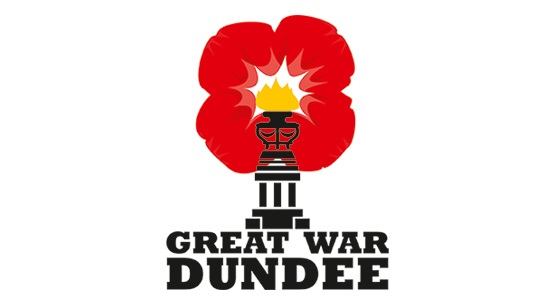Great War Dundee wins 2016 Stephen Fry Award
Published On Fri 15 Jan 2016 by Grant Hill

The Great War Dundee (GWD) Commemorative Project has won the Stephen Fry Award for Excellence in Public Engagement with Research 2016.
University of Dundee historians Dr Billy Kenefick and Dr Derek Patrick co-founded the GWD project and, alongside partner groups, are coordinating the city-wide approach to commemorate the conflict. Their research has led to startling discoveries about Dundee’s contribution to the war effort as well as a greater understanding of the conflict’s impact and legacy in the city.
Through various initiatives and events, Dr Kenefick, Dr Derek Patrick and their colleagues Caroline Brown (Archive Services) and Matthew Jarron (Museum Services) have worked tirelessly to communicate the research results to a wide audience in Dundee and beyond.
The University-based members of GWD received the Stephen Fry Award as part of the annual Discovery Days event, which took place at the Dalhousie Building, Old Hawkhill, on Friday, 15th January.
Stephen Fry, former Rector of the University, congratulated the winners in an audio recording that will be played when they receive their awards.
He said, “Initiated by Billy and Derek, the partnership brings together 15 local and national organisations, and underpins the project as it engages with audiences from Dundee and beyond.
“Billy’s work focuses on war resisters and conscientious objectors while Derek has explored the history of the Black Watch and memorialisation of the war. The reputation of their work won them funding to become two of the three Scottish advisors to the BBC for their Great War radio and online coverage.
“The University’s museum and archive collections include a variety of unique materials relating to the Great War, notably the Joseph Lee collection about the Dundee artist and war poet. Matthew and Caroline have both undertaken research in this area, including their joint work on Joseph Lee and other publications.
“It is a pleasure to announce that the Great War Dundee project is to be awarded the 2016 Stephen Fry Award for Excellence in Public Engagement with Research and it is always a genuine privilege to see my name attached to the brilliant projects emerging from Dundee.”
The Great War Dundee partnership was created in 2011. An Imperial War Museum First World War Centenary Partner, the project aims to bring together the community by involving the city's museums, archives, libraries, schools, businesses, societies and voluntary organisations. The goal is to encourage the broadest possible public participation through a series of collective reminiscence events.
In August 2014, GWD worked with the BBC to stage their touring World War One at Home event in Dundee as part of the commemoration of the centenary of the outbreak of WWI. More than 10,000 people attended and took part in the activities the project team organised.
Great War Dundee followed up this success with the opening of the Post Office Memorial Shrine, a time capsule created by postal workers in 1945, and Matthew Jarron’s research on telegraphist Annie K Lamont, whose letter was in the box, was the focus of a feature on BBC Radio 4. Matthew and Caroline Brown published a new book of Joseph Lee’s war poetry, which had fallen from prominence over the past century but which is now enjoying a renaissance.
Thanks to the influence of GWD, the Scottish Government chose Dundee to be the centre of the national commemoration for the anniversary of the Battle of Loos. A commemorative concert in Caird Hall drew on extensive research into the battle by Billy and Derek and used letters and images supplied by Caroline from the archives. The concert featured a range of performers including the Royal Scottish National Orchestra, Dundee Symphony Orchestra and folk band Dallahan, who composed a new arrangement of one of Joseph Lee’s poems.
The Stephen Fry Award for Excellence in Public Engagement with Research celebrates the sharing of the world-class research carried out at Dundee with the wider public and is given to the researchers (or team) who have made the greatest contribution to public engagement in the past year.
Last year’s award was shared by the FIRST: Fatality Investigation and Review Studies team that created a unique system that aims to cut Scotland’s high rate of child deaths and Five Million Questions, which saw the University play a major role in the Scottish independence referendum by creating a forum in which serious, research-informed discussion about the vote and the issues it raised could take place.